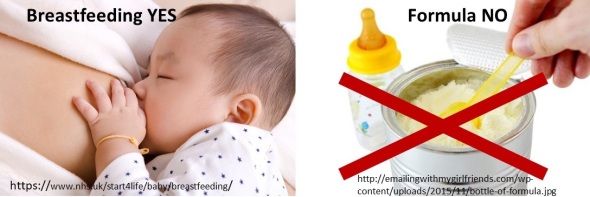Reduce the risk for ADHD: Breastfeed your baby
Posted: June 30, 2018 Filed under: ADHD, Evolutionary perspective, Nutrition/diet, Uncategorized | Tags: allergic rhinitis, asthma, breastfeeding, breastmilk, exzema, infants 3 Comments
In a superb meta-analysis, Professor Ping-Tao Tseng and colleagues (2018), found that breast feeding reduces the risk of ADHD. The longer the breast feeding was the sole food source, the lower the risk of ADHD. Read the complete article, Material breastfeeding and attention-deficit/hyperactivity disorders in children: a meta-analysis.
One should not be surprised by this finding– breastmilk has been the primary food source for babies since the dawn of human evolution. To accept that formula is as good as breast milk is foolish. Breast milk provides the essential nutrients for infants’ growth, contains the appropriate fatty acids for brain development, and the bioactive factors to protect the baby against disease (Oddy, 2001). It modulates the sleep wake cycle since the evening breast milk contains nucleotides that promote baby’s sleep which are different from morning breast milk that promotes wakefulness (Sanchez et al, 2009). In addition, it reduces the risk of asthma, eczema, and allergic rhinitis (Lodge et al, 2015). Despite the commercial advertisements that formal is as good as breast milk, it contributes to neural malnutrition. That babies do develop with formula is a remarkable demonstration of human adaptability.
Food is our building blocks. When we consume low quality foods, we may increase the risk of developing illness. This is analogous to using superb building materials when constructing a house as the building is more resilient and may better survive the assault from the environment such as termites, storms, or earthquakes than if built from inferior materials.
People, businesses and government have a choice. We can pay the upfront costs to support women to breastfeed their babies for a year by providing paid leave from their jobs or pay much higher long term costs to remediate and treat the deficiencies induced by not supporting breast feeding.
If you are concerned about your child’s future health and want to reduce the risk of ADHD, asthma, eczema, or allergic rhinitis there is only one recommendation: Breast feed your baby for a long time period.
References